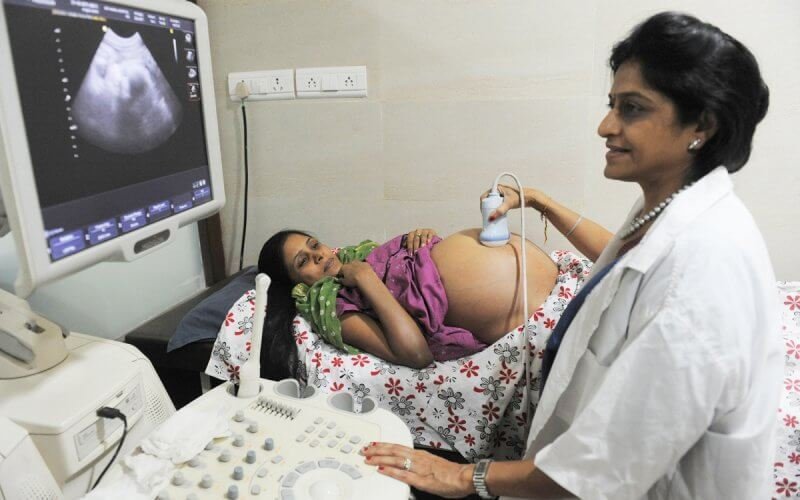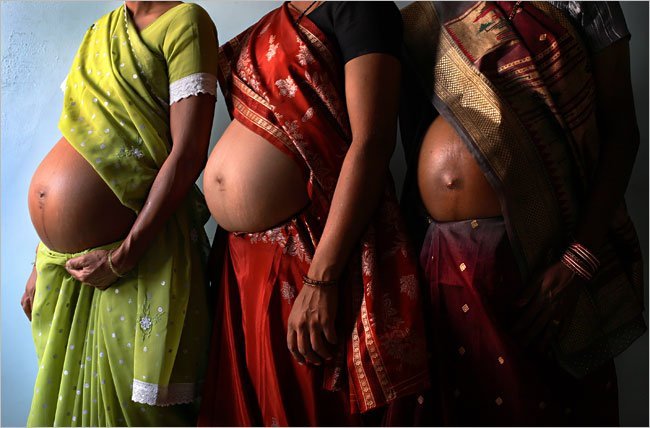When researching her book The House of Hidden Mothers, Meera Syal discovered that surrogate mothers in India are the most exploited, and most become surrogates because “they have nothing else of value they can sell, they don’t have education, they don’t have any money.” Indians called for regulation of the surrogacy industry in India, and when the government listened, we were all hopeful. The Surrogacy Regulation bill was drafted, and now it has been cleared by the Cabinet. But there are far too many problematic aspects to be truly happy about it. Commercial surrogacy has been criminalised by the Bill, which may sound like a good thing, but isn’t really.

“Unmarried couples, single parents, live-in partners and homosexuals cannot opt for surrogacy as per the bill. Legally wedded couples, who have been married for at least five years, can opt for surrogacy,” said Sushma Swaraj, Minister of External Affairs.
While homosexuality is still criminalised in India, they won’t have any rights, least of all the right to have children. That’s a separate debate altogether, but what about single parents or live-in partners? If they’re legally allowed to adopt children, why are they not allowed to have children via surrogacy? It’s not like they’re completely being denied the right to have children, they’re being denied the right to have biological children.
When one says “legally wedded couples, who have been married for at least five years” are the only ones eligible to have children through surrogacy, it simply implies that those in happy, non state-sanctioned relationships are not capable of raising children. Because somehow, a piece of paper binding two people together makes them capable of the task. In reality, this has nothing to do with children, it is simply the state’s attempt to ensure that the institution of marriage is looked at as more sacred and legitimate in society.
Sushma Swaraj also said, “We do not recognise live-in and homosexual relationships, that is why they are not allowed to commission babies through surrogacy. This is against our ethos.” Laws have nothing to do with ethos, so maybe our policy makers could try setting their moral standards aside when creating policies.

If you fulfil the government’s moral standards, and you’re a heterosexual couple who have been married for five years, you may still not be eligible. You need to have “proven infertility” to be eligible. You can’t pay the surrogate anything, besides paying for any and all of her medical bills, making this a purely altruistic act. But the surrogate has to be a “close relative.”
At this point, two people have already dealt with the emotional trauma of discovering that they cannot have children themselves. And then they have to go through additional trauma and hassle trying to find a “close relative” who will agree to carry their child. Logic is obviously not the government’s best friend.
“Foreigners as well as NRIs and PIOs who hold Overseas Citizens of India (OCI) cards have been barred from opting for surrogacy,” said Sushma Swaraj. This is because “divorces are very common in foreign countries.”
Once again, foreign couples are allowed to adopt in India. So why can’t they have a child by surrogacy? Yes, it’s true that there are several malpractices that take place, like couples abandoning children with genetic or physical abnormalities. But this can very easily be addressed by regulating surrogacy laws, not preventing foreign couples from having any kids. What this will do, is ensure that surrogacy becomes a thriving black market.

How is it okay to say “divorces are very common in foreign countries”? If we’re not okay with being generalised as a country of snake charmers and godmen, we have no right to say “divorces are very common in foreign countries.” Even if they were common, what does Swaraj want exactly? That a couple stay in an unhappy marriage because divorce somehow makes them bad parents?
The surrogate has to be a married woman, who has already borne a healthy child before.
Why does the surrogate need to be married? Why does she need to have had a child already? How are any of those things related to her bearing a child?
The constant stress on marriage is another way in which the government is imposing a certain moral code and conservative values on citizens.
The main aim of the #SurrogacyBill is to not allow #surrogacy to those people who need it the most.
Because it is against our ethos!— Shirish Kunder (@ShirishKunder) August 25, 2016
Rubbishing of paternity leave & new surrogacy law show this is our most socially conservative govt yet, re-establishing old gender equations
— Shekhar Gupta (@ShekharGupta) August 25, 2016
Surrogacy Bill needs a re-look. Categories of people excluded from surrogate parenthood is too large. Don’t deny them happiness.
— Swapan Dasgupta (@swapan55) August 25, 2016
The new surrogacy law increases the power of the nanny state. It should be up to women to decide if they want to be surrogates.
— Tavleen Singh (@tavleen_singh) August 25, 2016
.@VidyaKrishnan Another specious argument. Married couples are allowed to adopt as well. So why bother allowing them to go in for surrogacy?
— Siddharth (@svaradarajan) August 24, 2016
While some people are saying that those not allowed to have a child via surrogacy are allowed to adopt, we’d like to point out that married couples are also allowed to adopt. So why is it that they have more rights, as far as it comes to raising children? By telling every couple outside the ambit of heterosexual married relationships that they are ineligible to have children via surrogacy, this Bill becomes the government’s way of rejecting their existence. Marriage does not automatically give you great parenting abilities—it’s time our extremely regressive government understood that.

















